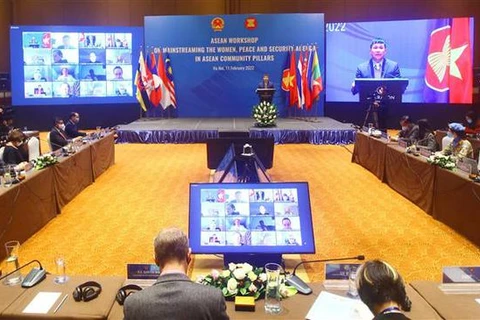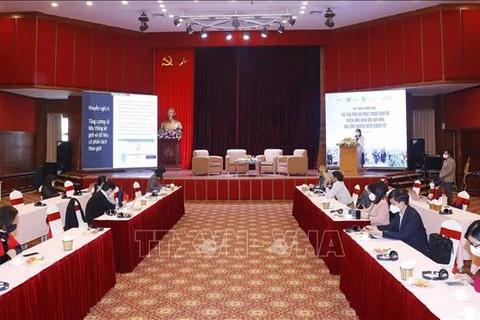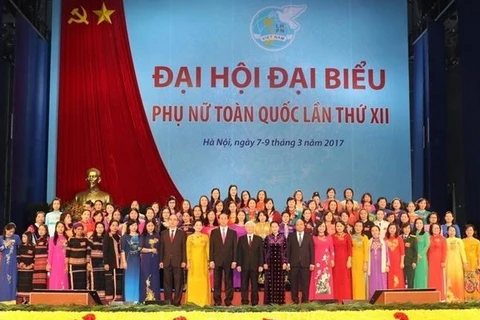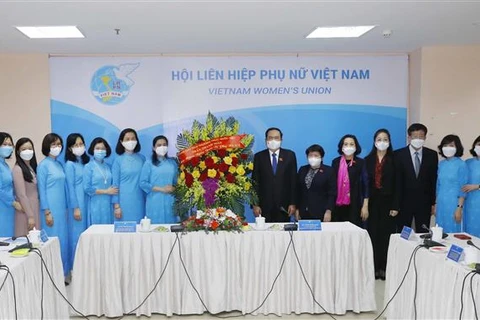Hanoi (VNA) - Elisa Fernandez Saenz, Country Representative of UN Women in Vietnam, has recommended that to achieve the best effect from the policies and programmes on climate, the environment, and disaster risks, the country put women and girls at the centre of decision-making.
In a recent interview granted to the Vietnam News Agency (VNA), she noted the theme of this year’s International Women’s Day (March 8), “Gender equality today for a sustainable tomorrow”, aims to recognise contributions by women and girls across the world, who bear most of the responsibility in climate change adaptation and mitigation efforts, so as to build a more sustainable future for all.
This theme also matches of the coming priority theme of the UN Commission on the Status of Women: “Achieving gender equality and the empowerment of all women and girls in the context of climate change, environmental and disaster risk reduction policies and programmes.”
Around the world, gender inequality and the climate and environmental crises are the biggest challenges to sustainable development of the era, with disproportionate impacts on women and girls, especially the vulnerable and fringe groups, according to Saenz.
Socio-economic impacts of the COVID-19 pandemic have also increased effects of the climate and environmental crises and pushed the people who are lagging behind further into extreme poverty, she said, adding that in this context, women and girls often suffer from more adverse impacts.
In Vietnam, which is facing growing impacts of climate change and natural disasters, severe droughts and floods over the past years have not only caused major economic losses but also led to negative consequences on every aspect of people’s life, particularly the life of the most vulnerable groups.
The UN Women official cited international experience as showing that the policies and programmes on climate, the environment, and disaster risks will have the best effect once women and girls are put at the centre of decision-making.
She suggested Vietnam mainstream gender perspectives in the policies and programmes on disaster, climate, and environmental risk reduction; promote women and girls’ full and equal participation and leadership in climate, environmental, and disaster actions and risk management at all levels; and build up the resilience of women, girls, and women’s organisations.
The country should also increase prevention, response to, and settlement of gender-based and sexual violence in all the climate and environmental crises and disasters; boost funding for gender responsive initiatives on climate, the environment, and disaster risks, assist women’s organisations, businesses, and cooperatives; while improving and investing in gender statistics in the links between gender and the environment, the UN Women representative added./.
In a recent interview granted to the Vietnam News Agency (VNA), she noted the theme of this year’s International Women’s Day (March 8), “Gender equality today for a sustainable tomorrow”, aims to recognise contributions by women and girls across the world, who bear most of the responsibility in climate change adaptation and mitigation efforts, so as to build a more sustainable future for all.
This theme also matches of the coming priority theme of the UN Commission on the Status of Women: “Achieving gender equality and the empowerment of all women and girls in the context of climate change, environmental and disaster risk reduction policies and programmes.”
Around the world, gender inequality and the climate and environmental crises are the biggest challenges to sustainable development of the era, with disproportionate impacts on women and girls, especially the vulnerable and fringe groups, according to Saenz.
Socio-economic impacts of the COVID-19 pandemic have also increased effects of the climate and environmental crises and pushed the people who are lagging behind further into extreme poverty, she said, adding that in this context, women and girls often suffer from more adverse impacts.
In Vietnam, which is facing growing impacts of climate change and natural disasters, severe droughts and floods over the past years have not only caused major economic losses but also led to negative consequences on every aspect of people’s life, particularly the life of the most vulnerable groups.
The UN Women official cited international experience as showing that the policies and programmes on climate, the environment, and disaster risks will have the best effect once women and girls are put at the centre of decision-making.
She suggested Vietnam mainstream gender perspectives in the policies and programmes on disaster, climate, and environmental risk reduction; promote women and girls’ full and equal participation and leadership in climate, environmental, and disaster actions and risk management at all levels; and build up the resilience of women, girls, and women’s organisations.
The country should also increase prevention, response to, and settlement of gender-based and sexual violence in all the climate and environmental crises and disasters; boost funding for gender responsive initiatives on climate, the environment, and disaster risks, assist women’s organisations, businesses, and cooperatives; while improving and investing in gender statistics in the links between gender and the environment, the UN Women representative added./.
VNA

























